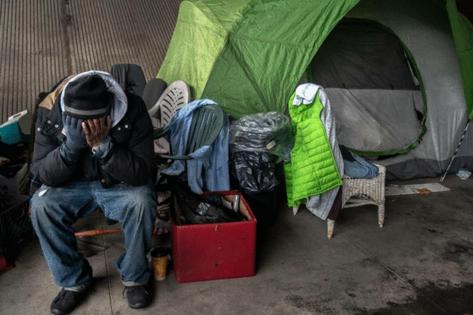Black people are increasingly overrepresented in Sacramento homeless population, report says
Published in News & Features
The percentage of Black people in Sacramento’s homeless population, already vastly overrepresented, has again increased.
Although only 9% of Sacramento’s general population is Black, Black residents now comprises a whopping 35% of Sacramento’s homeless population, the report found. That number jumped from 31% in 2022, the last time the federally-mandated homeless census count was performed.
Almost 60% of homeless people living in households with children were Black. Twenty percent of the homeless who died last year in Sacramento are Black.
“This is devastating, year after year, the numbers of Black Californians who are falling into homelessness,” said Dr. Kara Young Ponder, director of community engagement and racial justice at University of California, San Francisco Benioff Homelessness and Housing Initiative, on hearing the Sacramento figures Friday. “It’s devastating to see these numbers rising.”
The Sacramento figure surpasses the percentage of Black people experiencing homelessness statewide by nearly 10%. In California, 26% of the homeless population is Black, nearly four times the state’s Black population of 7%.
Ponder laid out the systemic causes that have left so many unhoused in her February report, “Toward Equity: Understanding Black Californians’ Experiences of Homelessness.”
Historic barriers to housing, employment, credit and health care, long the products of systemic racial bias, also create a pipeline to homelessness for many Black Californians living on the streets.
That pipeline is accelerated by jail or prison. Incarceration increases the risk for homelessness “because of the impact of criminal justice records on every aspect of life: educational opportunities, employment, and housing,” the Ponder report read.
Nearly eight in 10 homeless Black Californians had served jail time at some point in their lives, similar to other groups, according to the report. Black Californians, however, were more likely to report a prison stay than their white counterparts.
More affordable and accessible routes to housing, increased pay, clean-slate programs for those with past criminal histories, and more effective laws to combat housing discrimination are among Ponder’s prescriptions to tackle the crisis.
Until then, Black Californians on the margins of housing and homelessness “tend to be deprioritized” when they search for shelter, Ponder said.
Long waiting lists for available affordable housing contain other landmines, she said, pointing to poor or incomplete credit history or a prior criminal record that can derail the search for a roof and a bed even before the hunt for housing has begun.
“When you consider (leaving) homelessness, you think about the requirements needed to get back into housing — waiting lists, who gets a voucher, who doesn’t get a voucher,” Ponder said. “It’s hard to get housing or a room. It’s even harder for Black Americans.”
Black people are also overrepresented in Sacramento’s homeless deaths. Of the up to 227 homeless people who died last year, 44 were fully Black, or 20%. That’s more than double their makeup in the general county population.
They included Eddie Anderson, 63, who died of cardiovascular disease outdoors at a camp along the American River Parkway in January.
Sandra Ross, 68, died in a Stockton Boulevard hotel, also of cardiovascular disease.
Allen “Seaside” Walley, 55, died in July when he was hit by a vehicle in the River District. Lonzie Washington, 54, died of cardiovascular disease and meth at a River District shelter being used as a Sacramento County warming center during a December cold snap.
Of the Black people counted in the latest count, only half were in shelters. Many are on the city waiting list for a shelter.
The list is 2,500 people long.
____
©2024 The Sacramento Bee. Visit at sacbee.com. Distributed by Tribune Content Agency, LLC.







Comments